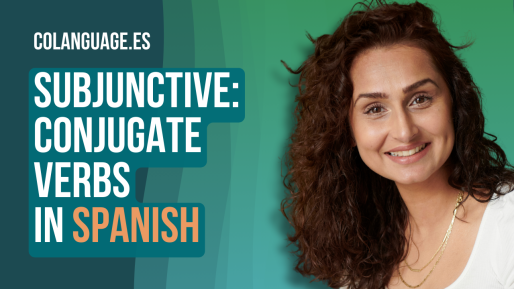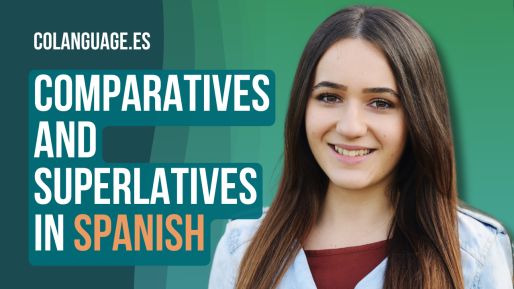Reflexive verbs in Spanish: rules and conjugation in the present tense Share Copied!
Spanish
Learn the conjugation of reflexive verbs in Spanish and use them in real situations.
Video
Podcast
What are reflexive verbs?
Imagine doing something like brushing your teeth or washing your hands. In Spanish, when you do these kinds of actions to yourself, you use reflexive verbs.
-
Se despierta. (She wakes up.)
-
Me lavo. (I wash myself.)
Reflexive verbs indicate that the subject of the verb is also the recipient of the action. In Spanish, reflexive verbs usually end in "-se" in the infinitive.
-
Vestirse (To get dressed)
-
Levantarse (To get up)
Rules for using reflexive verbs in Spanish
There are many different use cases for reflexive verbs in Spanish.
Describing personal routines
Reflexive verbs are used for personal care routines like waking up, showering or getting dressed.
| Infinitive form | Spanish | English |
|---|---|---|
| Ducharse (to shower) |
Me ducho por las noches. | I shower at night. |
| Levantarse (to get up) |
Ellas se levantan temprano. | They get up early. |
When a verb is conjugated, the pronouns come before the verb.
Expressing future actions, plans or intentions
Reflexive verbs can be used to express an action that is about to happen, indicating the intention or future plan of the subject.
| Infinitive form | Spanish | English |
|---|---|---|
| Casarse (to get married) |
Se van a casar el próximo mes. | They are going to get married next month. |
| Lavarse (to wash) |
Voy a lavarme las manos. | I am going to wash my hands. |
In some cases, the pronoun can come either before or after the verb. This happens for example when there is already a conjugated verb in the sentence.
Quiero bañarme / Me quiero bañar. (I want to have a bath.)
Talking about feelings or emotions
Reflexive verbs are also used for talking about feelings or emotions.
| Infinitive form | Spanish | English |
|---|---|---|
| Emocionarse (to get emotional) |
Me emociono siempre con la misma película. | I always get emotional with the same movie. |
| Sentirse (to feel) |
Ellas se sienten cansadas del viaje. | They feel tired from the trip. |
Expressing reciprocal actions
You can also use reflexive verbs to express the reciprocal action of two or more people.
| Infinitive form | Spanish | English |
|---|---|---|
| Ayudarse (to help each other) |
Se ayudan mutuamente en momentos difíciles. | They help each other in difficult times. |
| Escribirse (to write to each other) |
Nos escribimos todos los meses. | We write to each other every month. |
Reflexive verbs are very common when expressing a command or an order. In these cases, the reflexive pronoun is attached to the end of the verb.
Abrazarse (To hug each other) ¡Abrázame! (Hug me!)
Listening exercise
This dialogue demonstrates the different use cases for reflexive verbs in the present tense.
| Spanish | English | |
|---|---|---|
| Daniel | Estoy emocionado porque recibí tu carta. | I am excited because I received your letter. |
| María | Me alegra que te haya gustado. Me gusta mucho escribirte. | I am glad you liked it. I really like writing to you. |
| Daniel | Tus palabras siempre me ayudan a sentirme mejor. | Your words always help me feel better. |
| María | ¿Podemos abrazarnos cuando nos veamos? | Can we hug when we see each other? |
| Daniel | ¡Claro que sí! Siempre es reconfortante abrazarse. | Of course! It's always comforting to hug. |
Conjugation of reflexive verbs using reflexive pronouns
Each personal pronoun has its own reflexive pronoun. The reflexive pronoun can come before the verb or after. The table shows an example for each reflexive pronoun.
| Pronoun | Spanish | English |
|---|---|---|
| Me (myself) | Me siento cómodo en casa. | I feel comfortable at home. |
| Te (yourself) | Te concentras mucho cuando estudias. | You concentrate a lot when you study. |
| Se (him-/herself) | Se estira después de hacer ejercicio. | He stretches after exercising. |
| Nos (ourselves) | Nos encontramos en el parque para hablar. | We meet in the park to talk. |
| Os (yourselves) | Os divertís en la playa durante las vacaciones. | You have fun at the beach during vacations. |
| Se (themselves) | Se relajan en el sofá al final del día. | They relax on the couch at the end of the day. |
In the present tense, reflexive verbs are conjugated according to the subject pronoun and follow a specific pattern based on regular verb conjugation rules.
Me levanto temprano todos los días. (I wake up early every day.)
Ella se cepilla los dientes después de cada comida. (She brushes her teeth after every meal.)
Listening exercise
In this dialogue, the conjugation of reflexive verbs is practised.
| Spanish | English | |
|---|---|---|
| Daniel | Hola, ¿cómo te sientes hoy? | Hello, how are you feeling today? |
| María | Me siento un poco estresado, pero estoy tratando de concentrarme en el trabajo. | I feel a bit stressed, but I'm trying to concentrate on work. |
| Daniel | ¿Por qué no te estiras un poco y luego nos encontramos para tomar un café? | Why don't you stretch a bit and then we meet for a coffee? |
| María | ¡Eso suena genial! Me encantaría salir y divertirme un poco. | That sounds great! I'd love to go out and have some fun. |
| Daniel | Perfecto, entonces nos vemos en el café en media hora y nos relajaremos juntos. | Perfect, then we see each other at the coffee place in half an hour and we'll relax together. |
List of most common reflexive verbs in Spanish
This table includes the most commonly used reflexive verbs in Spanish and their conjugation in the simple present.
| Infinitive form | Spanish | English |
|---|---|---|
| Levantarse (to wake up) |
Yo me levanto temprano todos los días. | I wake up early every day. |
| Cepillarse (to brush) |
Tú te cepillas los dientes después de cada comida. | You brush your teeth after every meal. |
| Vestirse (to get dressed) |
Él se viste con su traje favorito para la fiesta. | He gets dressed in his favourite suit for the party. |
| Peinarse (to comb) |
Ella se peina antes de salir a trabajar. | She combs her hair before going to work. |
| Sentarse (to sit) |
Nosotros nos sentamos juntos en la mesa. | We sit together at the table. |
| Acostarse (to go to bed) |
Vosotros os acostáis muy tarde. | You go to bed very late. |
| Divertirse (to have fun) |
Se divierten en el concierto. | They have fun at the concert. |
Key takeaways
Here is a quick summary of this lesson.
- Reflexive verbs indicate that the subject of the verb is also the recipient of the action.
- You use reflexive verbs among other things to describe personal routines, to express future actions, plans or intentions, to talk about feelings or emotions or to express reciprocal actions.
- Each personal pronoun has its own reflexive pronoun. The reflexive pronoun can come before the verb or after.
Subscribe to our social media channels to get free daily exercises!



